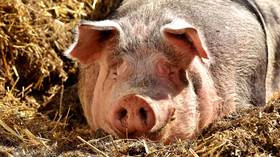Researchers make move on animal organ transplant for humans – media

Multiple research and university hospitals have approached the US Food and Drug Administration (FDA) with requests for permission to experiment with transplanting animal organs into human recipients, the Wall Street Journal reported on Friday. The proposals envision strictly regulated clinical trials and would be decided on a case-by-case basis, the WSJ said, citing sources familiar with the matter.
The FDA convened a public advisory committee meeting on Wednesday, discussing possible regulatory requirements for interspecies transplantation – also known as xenotransplantation – with transplantologists, according to the outlet.
Among the institutions that recently sought FDA guidance on clinical trials, or sought approval for them, is the University of Maryland Medical Center in Baltimore. In January, they transplanted a genetically modified pig heart into a critically ill 57-year-old man. David Bennett’s experimental surgery was done under an emergency authorization from the FDA. Within three weeks of the surgery, doctors found a pig virus in his new heart. Bennett died two months later, of causes that are still being investigated.
The University of Maryland is currently moving ahead with studies on baboons while seeking FDA guidance on additional steps required for human trials, Dr. Muhammad M. Mohiuddin, one of the doctors involved in Bennett’s surgery, told the WSJ.
Researchers at the University of Alabama at Birmingham also plan to seek FDA approval for a clinical trial, said Dr. Jayme Locke of the university’s Heersink School of Medicine’s Comprehensive Transplant Institute. The CTI had transplanted pig kidneys, which successfully produced urine, into the body of a brain-dead person earlier this year.
New York University’s Langone Transplant Institute is also interested, according to its director Dr. Robert Montgomery. “We are on the path to clinical trials,” he told the WSJ.
While the FDA is reportedly concerned about potential infections of animal organs that could spread not just to recipients but their family members, transplantologists are saying that it’s not possible to guarantee the donated human organs are perfectly healthy, either. Clinical trials would allow researchers to collect and share data, while giving the FDA better oversight, they say.
It is not clear if and when the FDA might give approval for the trials. Transplantologists are seeking access to animal organs to make up for a shortage of human donors. More than 6,000 Americans die every year waiting for an organ transplant, with over 100,000 people on a national waiting list, according to the United Network for Organ Sharing, the nonprofit contracted by the federal government to help allocate organs.














